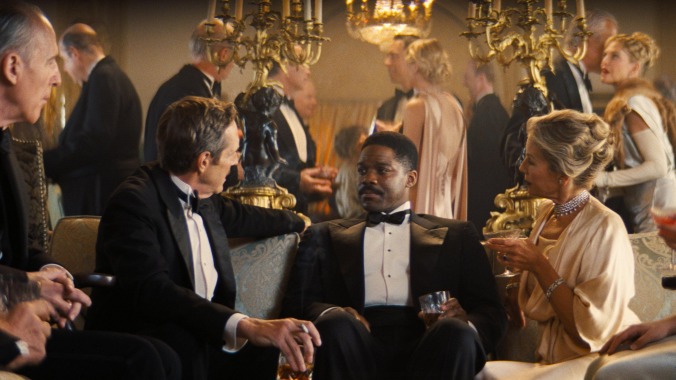Babylon review: Damien Chazelle's masterful Hollywood odyssey depicts the silent era like you've never seen it
Shimmering, mournful, and riotous, Babylon is one of the year's best movies, thanks in part to a star-making performance by Diego Calva

It’s the late 1920s at the start of writer-director Damien Chazelle’s shimmering and breathtaking old Hollywood odyssey Babylon, and the desert-like soils on the screen look nothing like today’s pricey L.A. enclave Bel Air. And yet, that’s what the masterful tragicomedy’s title card says about the remote reserve, which is eerily quiet until a truck cuts through the silence. There is a high-profile party somewhere thrown by Tinseltown mogul Don Wallach (Jeff Garlin). And to his shock, the driver needs to transport an elephant there, as insisted by a wide-eyed and ambitious fixer looking for his big break in the business.
Among the most fiercely talented filmmakers working today, Chazelle wastes no time rowdily hinting in this early scene that the Hollywood machine has always, well, crapped on the hardworking people that keep it running. But the aforesaid fixer Manny (Diego Calva, in a soul-stirring and star-making performance), a Mexican immigrant as obsessive in his pursuits as any of Chazelle’s former protagonists, can’t smell its relentless stink yet. In fact, he has no clue that the dreamy engine he worships is about to swallow him whole and spit him out.
Manny is our white rabbit as he leads the way (and the poor elephant) to perhaps one of the craziest and most kaleidoscopic parties ever put on the screen, one that immediately summons countless references from near-term cinema alone: from mazy Boogie Nights bashes (with far more indulgence), to Gaspar Noé’s Climax, to, chiefly, Martin Scorsese’s coke-fueled sequences. With an electric score by Justin Hurwitz (that occasionally resembles the chords in Chazelle’s La La Land too audibly), it’s all pure, eye-gouging debauchery for 30 or so minutes. Before the suggestive title Babylon appears, there will be plenty of orgies, mountains of drugs, sexual fetishes, naughty performance bits, projectile vomiting, and more sweaty bare bodies than one can count.
But even amid such normalized madness where one can barely notice the elephant in the room, you can’t ignore the aspiring starlet Nellie LaRoy—loosely inspired by silent-era star Clara Bow—played by a hypnotically vigorous Margot Robbie. Knowing that she is born a star, the hard-drinking and coke-snorting “wild child” from humble beginnings and a dysfunctional family manages to sneak into the fete. And predictably, it doesn’t take long for her to grab the attention of the right sort on her way up the ladder and become the selfless Manny’s passionate object of affection.
All this culminates into a darkly funny and dizzying sequence written and choreographed (like the rest of the picture) through meticulous long takes by Chazelle, a filmmaker with a knack for fluid narrative and visual coherence. And the segment’s breathless aftereffect isn’t just a pointless how-did-they-pull-this-off realization designed to merely wow with empty calories. This extensive intro—one of the year’s most impressive feats of filmmaking—feels as exhausting as Chazelle clearly intended it to be, serving as a denunciation of a town overflowing with unnamed skeletons concealed by the shadow of those who managed to claim the spotlight. Indeed, for every anonymous starlet who tragically ODs in some backroom, there is a bona fide movie star like Jack Conrad (Brad Pitt), who routinely changes life partners and takes his position of power for granted in an industry on the cusp of The Jazz Singer and the talkies that might have no room for him.
Pitt’s Conrad is meant to somewhat resemble silent-era leading men such as John Gilbert, Douglas Fairbanks, and Rudolph Valentino. But unable to deliver the diction that talkies demand, he equally brings to mind a character from Quentin Tarantino’s Once Upon A Time In Hollywood; not the stuntman he played, but Leonardo DiCaprio’s aging Western actor with an immense fear of the new wave that’s leaving him behind. While Conrad claims he’s pro-progress, the talkies sadly take a toll on the career of the aging star. In a merciless monologue, the great Jean Smart’s columnist Elinor St. John—call her an amalgamation of Hedda Hopper, Louella Parsons, and All About Eve’s Addison DeWitt—tells him as she sees it: the party is over, in the identical way it will one day be over for every A-lister that would come after him.





















![Rob Reiner's son booked for murder amid homicide investigation [Updated]](https://img.pastemagazine.com/wp-content/avuploads/2025/12/15131025/MixCollage-15-Dec-2025-01-10-PM-9121.jpg)


















